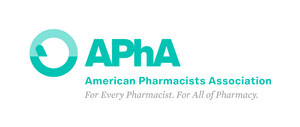APhA Offers Resource Guide for Applying Pharmacists' Patient Care Process to Immunization Services
WASHINGTON, Jan. 27, 2017 /PRNewswire-USNewswire/ -- The American Pharmacists Association (APhA) has developed a resource guide designed to incorporate immunization services into pharmacy practice settings based on the JCPP Pharmacists' Patient Care Process (PPCP). Pharmacists are integral members of the immunization neighborhood and have positioned immunization services as an important patient care offering.
An estimated 40,000 to 50,000 adults die annually from vaccine-preventable diseases in the United States and current, lower than desired, immunization rates provide an opportunity for pharmacists to play an important role in improving immunization rates and advancing public health.
The resource guide aligns the PPCP's core components collect, assess, plan, implement, and follow-up with immunization services. The document also supports implementation of the HHS - National Vaccine Advisory Committee's Adult Immunization Standard. This resource guide can be applied to any patient population, as the PPCP is neutral to care setting.
For the collect phase, the pharmacist should offer a screening questionnaire or otherwise obtain information about the patient's age, allergies, lifestyle, occupation, current medications, and health conditions. Next, the pharmacist should use this information to assess what immunizations the patient needs as well as make other determinations that would affect the administration of identified vaccines. After that, the pharmacist should craft an individualized care plan, implement that plan, and then monitor and evaluate the plan's effectiveness with sufficient follow-up as needed. The new resource also provides guidance on how to make a strong recommendation to patients that results in patients receiving necessary vaccinations. The PPCP supports the pharmacist's role within the immunization neighborhood.
"The document provides a guide for implementing immunization services within the pharmacist's patient care process that will ultimately lead to increased access to and the administration of vaccine," according to Mitchel Rothholz, APhA Chief Strategy Officer. "This benefits the health of our communities."
Every phase of the model involves communication and collaboration with patients, their caregivers, and the rest of their health care team. Where possible, the document advises pharmacists to develop a full picture of the patient's immunization history by consulting multiple sources, including immunization information systems (IIS), sometimes known as vaccine registries.
This resource guide was supported by Cooperative Agreement Number, IH23IP000984, funded by the Centers for Disease Control and Prevention. Its contents are solely the responsibility of the authors and do not necessarily represent the official views of the Centers for Disease Control and Prevention or the Department of Health and Human Services.
For more information on immunizations, go to the APhA Immunization Center.
About the American Pharmacists Association
The American Pharmacists Association, founded in 1852 as the American Pharmaceutical Association, is a 501 (c)(6) organization, representing more than 63,000 practicing pharmacists, pharmaceutical scientists, student pharmacists, pharmacy technicians and others interested in advancing the profession. APhA, dedicated to helping all pharmacists improve medication use and advance patient care, is the first-established and largest association of pharmacists in the United States. For more information, please visit www.pharmacist.com.
SOURCE American Pharmacists Association
Related Links
WANT YOUR COMPANY'S NEWS FEATURED ON PRNEWSWIRE.COM?
Newsrooms &
Influencers
Digital Media
Outlets
Journalists
Opted In






Share this article